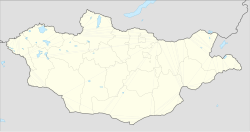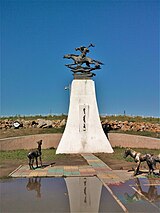| Revision as of 07:28, 10 December 2024 editChongkian (talk | contribs)Autopatrolled, Event coordinators, Extended confirmed users373,741 edits →Politics: add inline citation per WP:INCITE← Previous edit | Latest revision as of 02:50, 13 December 2024 edit undoChongkian (talk | contribs)Autopatrolled, Event coordinators, Extended confirmed users373,741 edits →Culture: got article already | ||
| (7 intermediate revisions by the same user not shown) | |||
| Line 88: | Line 88: | ||
| == History == | == History == | ||
| On October 17, 1961, the city of Darkhan was built with extensive economic assistance from the ].<ref name=eg/> As its name implies, the city was originally conceived to be a manufacturing site for Mongolia's northern territory. ] specialists built a ] plant, ] and a ] factory in Darkhan.<ref name=eg>{{cite magazine |last=Gronowska|first=Ewa|date=8 October 1988|title=Polska— Mongolia. Kraj daleki i bliski|magazine=Głos Pomorza|language=pl|issue=235|page=3}}</ref> ] built a meat factory, opened in 1974.<ref>{{cite magazine |author=<!--Staff writer(s); no by-line.-->|date=9 July 1974|title=Felavatták Mongóliában a magyar segítséggel épült darhani húskombinátot|magazine=Petőfi Népe|language=hu|issue=158|page=1}}</ref> | On October 17, 1961, the city of Darkhan was built with extensive economic assistance from the ].<ref name=eg/> As its name implies, the city was originally conceived to be a manufacturing site for Mongolia's northern territory. ] specialists built a ] plant, ] and a ] factory in Darkhan.<ref name=eg>{{cite magazine |last=Gronowska|first=Ewa|date=8 October 1988|title=Polska— Mongolia. Kraj daleki i bliski|magazine=Głos Pomorza|language=pl|issue=235|page=3}}</ref> ] built a meat factory, opened in 1974.<ref>{{cite magazine |author=<!--Staff writer(s); no by-line.-->|date=9 July 1974|title=Felavatták Mongóliában a magyar segítséggel épült darhani húskombinátot|magazine=Petőfi Népe|language=hu|issue=158|page=1}}</ref> | ||
| In 1985, the city housed the ] when a 16-story apartment was opened.<ref>{{cite news|last=B.|first=Batchimeg|date=8 December 2020|url=https://montsame.mn/en/read/246003|title=Architectural design of Mongolia’s first tallest building|work=Mongolian National News Agency|access-date=10 December 2024}}</ref> | |||
| The city remains a mostly industrial centre and is the home of some 82% of Darkhan-Uul Province's population. As with most urban Mongols, some 86% of the city's population live in residential apartments, with the remaining population living in ]s (gers) on the outskirts of the city.{{citation needed|date=May 2019}} | The city remains a mostly industrial centre and is the home of some 82% of Darkhan-Uul Province's population. As with most urban Mongols, some 86% of the city's population live in residential apartments, with the remaining population living in ]s (gers) on the outskirts of the city.{{citation needed|date=May 2019}} | ||
| Line 93: | Line 95: | ||
| ==Geography== | ==Geography== | ||
| With an elevation of {{convert|665|m|ft|0|disp=or}}, Darkhan is the capital of the ]. It is a city with notable ] influence, evidenced by the huge square buildings and heavy ] usage. Darkhan is surrounded by mountains and hills, also having some tourist attractions like ]s largely being ] attractions. Some parts of the city have wooden houses.<ref>maps.google.com</ref><ref>{{Cite web|url=https://www.youtube.com/|title=YouTube|website=www.youtube.com}}</ref> | With an elevation of {{convert|665|m|ft|0|disp=or}}, Darkhan is the capital of the ]. It is a city with notable ] influence, evidenced by the huge square buildings and heavy ] usage. Darkhan is surrounded by mountains and hills, also having some tourist attractions like ]s largely being ] attractions. Some parts of the city have wooden houses.<ref>maps.google.com</ref><ref>{{Cite web|url=https://www.youtube.com/|title=YouTube|website=www.youtube.com}}</ref> | ||
| The ] passes through the western edge of the city. | |||
| ===Climate=== | ===Climate=== | ||
| Line 166: | Line 170: | ||
| The ] is housed in a ] in the old town; it has recently become active again as a ] ]. | The ] is housed in a ] in the old town; it has recently become active again as a ] ]. | ||
| In addition, the city hosts the ]. This museum, also called the Traditional Museum of Folk Art, contains a collection of archaeological findings, traditional clothing, religious artifacts, and ]. | In addition, the city hosts the ]. This museum, also called the Traditional Museum of Folk Art, contains a collection of archaeological findings, traditional clothing, religious artifacts, and ]. | ||
| The city has a monument to the horse-head fiddle (]), the national emblematic instrument of Mongols. | The city has a monument to the horse-head fiddle (]), the national emblematic instrument of Mongols. | ||
| Line 179: | Line 183: | ||
| ==Infrastructure== | ==Infrastructure== | ||
| ]]] | ]]] | ||
| The city is powered by the ]. | The city is powered by the ]. Waste water is treated at the ] before being discharged to the nearby river. | ||
| ==Tourist attractions== | ==Tourist attractions== | ||
| * ] | |||
| * ] | * ] | ||
| * ] | |||
| == Transportation == | == Transportation == | ||
Latest revision as of 02:50, 13 December 2024
Provincial capital of Darkhan-Uul Province, Mongolia District in Darkhan-Uul Province, Mongolia| Darkhan
Дархан (Mongolian) ᠳᠠᠷᠬᠠᠨ | |
|---|---|
| District | |
| Darkhan District Дархан сум ᠳᠠᠷᠬᠠᠨᠰᠤᠮᠤ | |
 | |
 Coat of arms Coat of arms | |
| Nickname: Second capital | |
 | |
| Coordinates: 49°28′08″N 105°57′27″E / 49.46889°N 105.95750°E / 49.46889; 105.95750 | |
| Country | Mongolia |
| Province | Darkhan-Uul Province |
| Founded | October 1961 |
| Area | |
| • Total | 103 km (40 sq mi) |
| Elevation | 665 m (2,182 ft) |
| Population | |
| • Total | 87,696 |
| • Density | 850/km (2,200/sq mi) |
| Time zone | UTC+8 (UTC + 8) |
| Postal code | 213800 |
| Area code | +976 (0)137 |
| Vehicle registration | ДАx (x variable) |
| Climate | Dwb |
| Website | http://www.darkhan.mn/ |

Darkhan (/ˈdɑːrkɑːn/, UK also /ˈdɑːrhæn/; Mongolian: Дархан, [ˈtarχɴ̩]) is the third-largest city in Mongolia and the capital of Darkhan-Uul Aimag.
History
On October 17, 1961, the city of Darkhan was built with extensive economic assistance from the Comecon. As its name implies, the city was originally conceived to be a manufacturing site for Mongolia's northern territory. Polish specialists built a woodworking plant, brickworks and a lime factory in Darkhan. Hungarians built a meat factory, opened in 1974.
In 1985, the city housed the tallest building in the country when a 16-story apartment was opened.
The city remains a mostly industrial centre and is the home of some 82% of Darkhan-Uul Province's population. As with most urban Mongols, some 86% of the city's population live in residential apartments, with the remaining population living in yurts (gers) on the outskirts of the city.
Geography
With an elevation of 665 metres or 2,182 feet, Darkhan is the capital of the Darkhan-Uul Province. It is a city with notable Soviet influence, evidenced by the huge square buildings and heavy Cyrillic usage. Darkhan is surrounded by mountains and hills, also having some tourist attractions like statues largely being Buddhist attractions. Some parts of the city have wooden houses.
The Kharaa River passes through the western edge of the city.
Climate
Darkhan has a borderline humid continental climate (Dwb), close to the more typical subarctic climate (Dwc) of northern Mongolia, which is found in higher areas near the city, and only marginally wet enough to avoid qualifying as a semi-arid climate (BSk). These three climate types tend to overlap a good deal over the border regions of Mongolia, Russia and Kazakhstan. This area has extremely cold and dry winters; however the summers are warmer and more humid.
| Climate data for Darkhan, 1984–2010 | |||||||||||||
|---|---|---|---|---|---|---|---|---|---|---|---|---|---|
| Month | Jan | Feb | Mar | Apr | May | Jun | Jul | Aug | Sep | Oct | Nov | Dec | Year |
| Mean daily maximum °C (°F) | −16.9 (1.6) |
−10.1 (13.8) |
1.4 (34.5) |
13.1 (55.6) |
21.7 (71.1) |
27.2 (81.0) |
28.4 (83.1) |
26.4 (79.5) |
19.6 (67.3) |
10.7 (51.3) |
−3.1 (26.4) |
−13.4 (7.9) |
8.7 (47.8) |
| Mean daily minimum °C (°F) | −30.3 (−22.5) |
−25.9 (−14.6) |
−13.9 (7.0) |
−3.9 (25.0) |
3.1 (37.6) |
9.4 (48.9) |
12.8 (55.0) |
10.3 (50.5) |
2.9 (37.2) |
−4.9 (23.2) |
−16.6 (2.1) |
−25.8 (−14.4) |
−6.9 (19.6) |
| Average precipitation mm (inches) | 3.7 (0.15) |
3.0 (0.12) |
3.6 (0.14) |
9.5 (0.37) |
20.3 (0.80) |
52.1 (2.05) |
67.4 (2.65) |
67.2 (2.65) |
33.8 (1.33) |
12.5 (0.49) |
7.0 (0.28) |
4.6 (0.18) |
284.7 (11.21) |
| Average precipitation days | 6.7 | 5.3 | 4.5 | 6.0 | 7.8 | 12.3 | 13.8 | 12.4 | 8.5 | 6.1 | 6.9 | 7.7 | 98 |
| Source: World Meteorological Organization | |||||||||||||
Economy
The main industry of Darkhan is coal mining. It has also several heavy industries, such as metallurgy, chemical and construction.
Culture

The Kharagiin monastery is housed in a log cabin in the old town; it has recently become active again as a Buddhist monastery.
In addition, the city hosts the Museum of Darkhan-Uul Province. This museum, also called the Traditional Museum of Folk Art, contains a collection of archaeological findings, traditional clothing, religious artifacts, and taxidermy.
The city has a monument to the horse-head fiddle (morin khuur), the national emblematic instrument of Mongols.
Education
Darkhan is the second largest educational center in Mongolia, making the educational level of the city's population very high. Hundreds of students come to Darkhan from other parts of Mongolia to study. Currently in Darkhan Uul Aimag there are 10 higher education institutions, 25 secondary schools, 14 kindergartens, the Institute of Management and Development, the Regional Business Development Center and the Plant Science and Agricultural Training Research Institute.
Politics

Darkhan houses the Ministry of Food, Agriculture and Light Industry.
Infrastructure

The city is powered by the Darkhan Thermal Power Plant. Waste water is treated at the Darkhan Wastewater Treatment Plant before being discharged to the nearby river.
Tourist attractions
Transportation

Darkhan is served by the Darkhan-1 railway station in the north and Darkhan-2 railway station in the south. Darkhan is connected by four-lane road to Ulaanbaatar for a length of 204 km along the AH3.
Partner cities
Darkhan is partnered with:
- Dimitrovgrad, Bulgaria
- Irving, Texas, USA
- Kaposvár, Hungary
- Ulan Ude, Russia
- Zeitz, Germany
References
- ^ Gronowska, Ewa (8 October 1988). "Polska— Mongolia. Kraj daleki i bliski". Głos Pomorza (in Polish). No. 235. p. 3.
- "Felavatták Mongóliában a magyar segítséggel épült darhani húskombinátot". Petőfi Népe (in Hungarian). No. 158. 9 July 1974. p. 1.
- B., Batchimeg (8 December 2020). "Architectural design of Mongolia's first tallest building". Mongolian National News Agency. Retrieved 10 December 2024.
- maps.google.com
- "YouTube". www.youtube.com.
- "Updated Köppen-Geiger climate map" (PDF).
- "World Weather Information Service – Darkhan". World Meteorological Organization. Retrieved November 3, 2022.
- "Darkhan". Nomad's Land. Retrieved 10 December 2024.
- B., Onobold (21 October 2024). "President of Mongolia Visits Ministry of Food, Agriculture, and Light Industry of Mongolia in Darkhan City". Mongolian National News Agency. Retrieved 10 December 2024.
- "Darkhan-Uul". Mongolia Guide. Retrieved 11 September 2024.
- A., Munkhzul (13 May 2021). "Prime Minister checks Ulaanbaatar-Darkhan road construction progress". Mongolian National News Agency. Retrieved 10 December 2024.
- "Официален сайт на община Димитровград – Побратимени градове". Archived from the original on April 8, 2010.
| Districts of Darkhan-Uul | ||
|---|---|---|